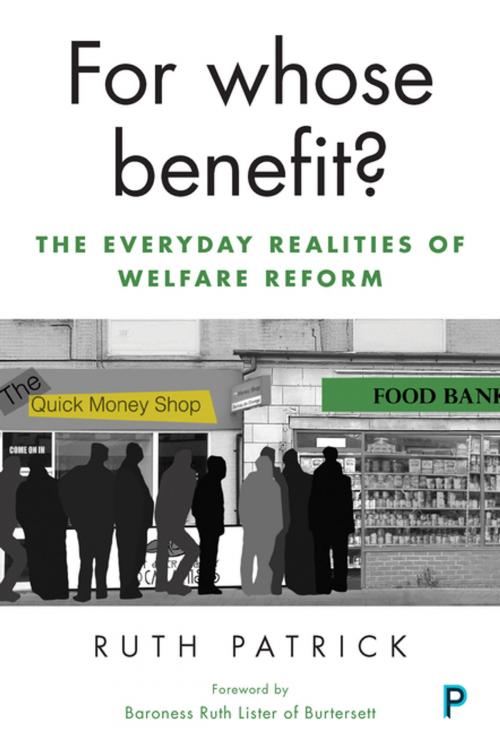For whose benefit?
The everyday realities of welfare reform
Nonfiction, Social & Cultural Studies, Political Science, Politics, Social Services & Welfare, Government, Social Policy, Social Science| Author: | Patrick, Ruth | ISBN: | 9781447333494 |
| Publisher: | Policy Press | Publication: | April 12, 2017 |
| Imprint: | Policy Press | Language: | English |
| Author: | Patrick, Ruth |
| ISBN: | 9781447333494 |
| Publisher: | Policy Press |
| Publication: | April 12, 2017 |
| Imprint: | Policy Press |
| Language: | English |
What does day-to-day life involve for those who receive out-of-work benefits? Is the political focus on moving people from ‘welfare’ and into work the right one? And do mainstream political and media accounts of the ‘problem’ of ‘welfare’ accurately reflect lived realities? For whose benefit? The everyday realities of welfare reform explores these questions by talking to those directly affected by recent reforms. Ruth Patrick interviewed single parents, disabled people and young jobseekers on benefits repeatedly over five years to find out how they experienced the rights and responsibilities of citizenship, and whether the welfare state still offers meaningful protection and security in times of need. She reflects on the mismatch between the portrayal of ‘welfare’ and everyday experiences, and the consequences of this for the UK’s ongoing welfare reform programme. Exploring issues including the meaning of dependency, the impact of benefit sanctions and the reach of benefits stigma, this important book makes a timely contribution to ongoing debates about the efficacy and ethics of welfare reform.
What does day-to-day life involve for those who receive out-of-work benefits? Is the political focus on moving people from ‘welfare’ and into work the right one? And do mainstream political and media accounts of the ‘problem’ of ‘welfare’ accurately reflect lived realities? For whose benefit? The everyday realities of welfare reform explores these questions by talking to those directly affected by recent reforms. Ruth Patrick interviewed single parents, disabled people and young jobseekers on benefits repeatedly over five years to find out how they experienced the rights and responsibilities of citizenship, and whether the welfare state still offers meaningful protection and security in times of need. She reflects on the mismatch between the portrayal of ‘welfare’ and everyday experiences, and the consequences of this for the UK’s ongoing welfare reform programme. Exploring issues including the meaning of dependency, the impact of benefit sanctions and the reach of benefits stigma, this important book makes a timely contribution to ongoing debates about the efficacy and ethics of welfare reform.















